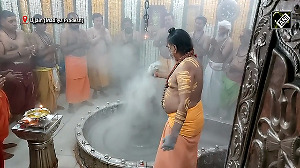The elusive H-1B visa, for which young software professionals yearn, has been severely compromised. Middlemen are exploiting the system by creating fake IT companies in the United States and obtaining these visas for a hefty sum without even a job.
This leaves thousands of deserving candidates in the lurch since there are only 65,000 such visas issued every year.
For most people, a stamp on the passport is the last hurdle crossed to launch their careers in the US. But for many getting this H-1B visa stamp is just the beginning of a painful journey of exploitation, underpayment, and unemployment.
This is the world of H-1B visa fraud, a well-oiled nexus of fake employers, job counsellors and immigration experts. Newspapers and cyberspace are filled with luring advertisements that claim to get you an H-1B for a price tag. So, can they?
Apparently they can. In a busy suburb of Mumbai, one such H-1B consultant is busy carrying out business. We approached them as H-1B aspirants eager to fly to the US. The range of services on offer was shocking. Here is the conversation we had with this agent:
Agent: We will get you a fake employer. He'll file for your H-1B. He will have a proper company and will be a US citizen.
Us: So what happens once we get there?
Agent: The fake employer who files for your H-1B will give you a work permit and will get away and once you get there, this fake employer will give you a no-objection certificate (NOC), saying you can work with any employer.
Us: Will you find me a job there?
Agent: Once you are there, we have people who will help you with contacts. We can only assist you.
Us: How much will it cost?
Agent: $2,250 will be the immigration fee, $2,250 will be lawyers charges.
Us: Do many people go to the US using this route?
Agent: People who know and who have relatives ask for fake employers. They want to go there on real jobs. . . Because here you won't get a job as good as the one you can get when you are in the US.
Us: How long it'll take to find a real job?
Agent: Jobs in the US are tremendous. The problem is not getting a job but getting a visa. We will have all the interviews lined up for you and once you get there, you will attend those and find a job.
********************
Using this route, these so-called counsellors send professionals to the US practically without a job. The search for jobs begins only after applicants land in the US. Individuals cannot apply for an H-1B visa on their own. Their employer must petition for them. Petitions for this visa begin on April 1 every year.
Once the petitions get approved, the employer sends the approved form to the employee who then appears for the visa interview in his home country. This visa is issued for a particular job but most of the times the so-called visa counsellors help candidates bypass this requirement. They take them to the US on fake job letters.
But sometimes touts go wrong too and that leaves many holding on to their H-1B visas endlessly waiting to get to the US.
Ramesh was one such victim. This 27-year-old engineer (whose real name has been withheld) narrated his plight from California. He told CNBC-TV18, "I was in India when I found a desi consultant. I got the reference from a friend. This company was basically into IT consulting. . . they took $3,000 from me and told me they'll give me a good job opportunity because they had clients and stuff."
"Till the time I gave them money, they were very courteous and told me that they'll give me a lot of salary and a lot of incentive and bonus. So, I was thinking it was a good company to start with. When my petition got approved and I told them I want to get to the US as soon as possible, their behaviour changed. They said we don't have any clients as of now and we don't have much knowledge about your field."
He finally succeeded in getting to the US, although he is still struggling to get his original documents from his counsellor.
But everyone doesn't get as lucky as Ramesh. Manoj, an H-1B visa holder is still waiting for the past one year to fly to the US. This 28-year-old was happy working in a leading multinational firm in Hyderabad, till he decided to head to the land of opportunities.
Like thousands of others like him, he too approached a consulatant to help him realise his dream to work in the US. His H-1B petition got approved in October 2006 but it was then that his ordeal started. Instead of taking him to the US, his broker took away his visa documents needed for him to take off.
He then asked Manoj to buy an IP phone with a US number and start looking for a job. Manoj spent many sleepless nights talking to his prospective employers in the US, all the time telling them that he was in the US. Most of the time, the job offers fell through when the employers, thinking Manoj was in the US, wanted him to join at a very short notice.
US authorities admit H-1B visa frauds are rampant. Last year alone, they found 2,000 H-1B applications suspicious. These applications were returned to the US Department of Homeland Security for reconsideration. The Consular Section Chief, US Consulate, Mumbai, Glen Keiser, says, "We also see people who are going to jobs that we suspect do not exist. These people are unable to describe their projects to us. When we do even a cursory examination, we may find that the company in the US is simply nothing more than just a shell. Neither are they in a position to offer work themselves nor do they have a client base, where they can send a qualified worker."
This year, 150,000 people applied for the quota of 65,000 H-1B visas. More than 40% of these petitions were made by Indians and the US consulate says a large number of applications that come to them are suspect.
Keiser explains: "We have found to our regret that Hyderabad and Bangalore are centres of H-1B visa fraud and that it is not difficult to walk into an operation and someone rather forthrightly tells you that they can produce anything to appear to qualify for an H-1B visa. And, in fact, we have had our employees conduct such operations and walking into such agents' office and ask questions."
The US consulate in India is increasing manpower in its fraud investigation team. They are also taking a tough stand against such fraudsters. As Keiser says, "We take such cases very seriously. If we can verify that you are presenting a fraudulent case to us, we will bar you for the rest of your life to enter the US. If we find out that you as an agent are assisting someone to illegally enter the US, we can even bar you from getting any kind of US visa."
But while the US government toughens its stands against such fraudsters in India, these consultants continue their business in broad daylight. A few consultants told us that, they can illegally get us smaller jobs in the US, till the time they find work for us that is suited to our qualifications.
One consultant told us, "You can work as a waiter or in a convenience store till you find a job. A lot of people do that. After all, you would have spent so much money in getting the H-1B visa."
Keiser says, "This is not legal. We are not taking in people to pump gas or to bake donuts. This visa is to bring in specialised knowledge workers to the United States and make them work for jobs they are qualified to do. That is to say, if I am a computer programmer, I am going to do computer programming and not pump gas till the time someone finds me a job of a computer programmer."
It's a vicious circle -- scamsters eat up the H-1B quota and force genuine Indian companies to depend on them for their manpower requirement. Valid for six years, H-1B visas allow highly skilled foreign workers to work in the US in specialised fields like IT, computing, accounting and finance.
Last year, out of the top 10 companies that received H-1B visas, 7 were Indian firms.
Pradeep Udhas, global head, sourcing advisory, KPMG, says, "Today, India's software companies are booming. They depend a lot on H-1B visas because their business models are such that they need people to be onsite. Their business models won't work if the H-1B visas are not given."
Last year, nine Indian IT companies bagged about 20,000 of the 65,000 H-1B visas issued. Seven Indian companies including Infosys, Satyam, Wipro and Tata Consultancy figured in the top 10 receivers of H-1B visas globally. Yet, Wipro got only 24%, while Infosys managed to get only 20% of what they petitioned for. Both the companies petitioned for 20,000 H-1B visas each. Wipro got 4,908, while infosys got 4,002 H-1B visas.
Immigration lawyer, Poorvi Chothani explains, "We represent a lot of IT companies who petition for their H-1B visas. This year, with a lot of petitions and the lottery system, we fear we will not be able to get them even half of their requirement."
The H-1B visa crunch forces these companies to hire from the H-1B workers' pool of these scamsters. . . and that too at a premium. Udhas says, "A lot of these IT companies are then forced to talk to these 'onesy-twosy' consultants and say, 'Okay, you give me your people.' These consultants take a huge cut for providing the services of these H-1B workers, without adding any value."
This is why most of the professionals who land up in the US on H-1B visas find a job within a few months with a genuine IT company. However, this is not the end of their misery. In most cases, the employee ends up getting only a part of his salary while the fake employer pockets 25% to 45% of his salary.
But even when dreams shatter and people end up working for jobs that they are over-qualified for, they shy away from reporting their 'fraud employers.' That is because they go away, leaving behind family and friends and expecting good prospects. They are shattered when the reality turns out to be much bleaker than what they had expected. And it is this hope that keeps the cash registers of these scamsters ringing.
Also, it is this flame of hope that allows thousands of gullible candidates to continue to be victimised by these visa touts.
For more on management, log on to www.moneycontrol.com.






 © 2025
© 2025